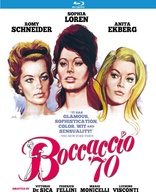Boccaccio '70 Blu-ray Movie
HomeBoccaccio '70 Blu-ray Movie 
Kino Lorber | 1962 | 205 min | Not rated | Oct 11, 2011Movie rating
6.8 | / 10 |
Blu-ray rating
| Users | 0.0 | |
| Reviewer | 4.0 | |
| Overall | 4.0 |
Overview
Boccaccio '70 (1962)
Four arresting tales of women's empowerment and the sexual revolution in Italy's 1960s boom years. A bigot obsesses over the gigantic poster of a voluptuous pin-up, a married woman finds a way of dealing with her husband's passion for call-girls, a sacristan wins a night with a beautiful fairground woman in a village lottery, and a married couple's mishap enables them to buy their own house.
Starring: Sophia Loren, Romy Schneider, Anita Ekberg, Marisa Solinas, Tomas MiliánNarrator: Isa Di Marzio
Director: Vittorio De Sica, Federico Fellini, Mario Monicelli, Luchino Visconti
| Foreign | Uncertain |
| Drama | Uncertain |
| Romance | Uncertain |
| Comedy | Uncertain |
| Fantasy | Uncertain |
Specifications
Video
Video codec: MPEG-4 AVC
Video resolution: 1080p
Aspect ratio: 1.85:1
Original aspect ratio: 1.85:1
Audio
Italian: DTS-HD Master Audio Mono (48kHz, 16-bit)
Subtitles
English
Discs
50GB Blu-ray Disc
Single disc (1 BD)
Playback
Region free
Review
Rating summary
| Movie | 4.5 | |
| Video | 4.0 | |
| Audio | 3.5 | |
| Extras | 1.0 | |
| Overall | 4.0 |
Boccaccio '70 Blu-ray Movie Review
Four tales of sex in 1960s Italy.
Reviewed by Casey Broadwater October 21, 2011In his famously bawdy collection of 100 tales, The Decameron, humanist author Giovanni Boccaccio cast a critical eye on 14th century Italian
culture, mocking religious hypocrisy in the wake of the Black Plague, detailing the differences between newly defined social classes, and attempting to
change the country’s Church-stultified attitudes towards sex by portraying love as complicated and the source of much folly, but entirely natural—that
is, not shameful or sin-ridden.
In 1962, some six-hundred years later, four of Italy’s greatest filmmakers—Mario Monicelli, Federico Fellini, Luchino Visconti, and Vittorio de Sica—
would borrow the frame-story device of The Decameron and take a similarly askew glance at the pretensions and sexual standards of their own
time in Boccaccio ‘70, a four-part anthology film that’s sexy and strange, elegant and comic, sometimes all at once. Made after Italy’s post-war
prosperity began to kick in, but before the cultural revolution of the mid-to-late 1960s, the film documents a society in transition, with widening
generational/gender gaps and morality—especially sexual morality—in a state of flux. The film itself seems caught between two times; neither prudish
nor especially explicit, it might best be described as coy, batting its eyelashes and beckoning to the audience with a come-hither gaze. It’s damn near
irresistible. No one did sexy, nonchalant cool like the Italian directors of the 1960s.

In Act I, Renzo e Luciana, director Mario Monicelli introduces us to an errand boy (Germano Gilioli) and a bookkeeper (the gorgeous Marisa Solinas) who are deeply, secretly in love. Luciana’s been feeling nauseated, and suspects she may be pregnant, so the two get wedded in a makeshift, spur-of-the-moment ceremony that’s met with disapproval by her stern parents. Since they don’t make enough on their meager salaries to buy a place of their own, Renzo and Luciana have to move into her family’s cramped apartment, which leaves them no privacy on their wedding night—or any other night, for that matter. The sexual tension is palpable. All they want to do is do it, but the walls are thin, dad is playing poker in the next room with his buds, and someone is blaring a boxing match on television. The mood ain’t exactly right. Making matters worse, they have to keep their nuptials a secret from their boss, a lecher who forbids his female employees from getting hitched and making babies, partially because there was no maternity leave in those days, but mostly because the guy wants to seduce his workers himself. At its core, the film is about pressure—the pressure to have (or not have) premarital sex, the pressure to get hitched if you get knocked up, and the financial pressure of being young and immaturely married—and the sexually stymied couple is portrayed beautifully by Gilioli and Salinas as horny, frustrated, and not quite in control of their own lives.
In Act II, Fellini’s Le tentazioni del dottor Antonio, the false virtue under fire is prudery—specifically the fiery, religious brand of indignation towards sex that’s typically the result of repression and guilt. Peppino de Filippo stars as Antonio Mazzuolo, a self-righteous citizen who takes it upon himself to crusade for public decency. He’s a pious tyrant, basically, the kind of guy who goes down to Lover’s Lane to shine bright lights on the couples making out in their cars. What really gets his goat, though, is when an advertising agency erects a billboard in the vacant lot across from his home, with the image of a sultry, large-chested sex-bomb blond—Anita Ekberg, looking like a precursor to Anna-Nicole Smith—reclining bare-legged on a couch and holding a frosty glass of milk. Antonio calls it “an offense to the most sacred aspect of maternity”—breastfeeding—and makes it his mission to get the sign taken down. His quixotically sanctimonious obsession leads gradually to all-out insanity, as Antonio imagines the woman coming down out of the billboard and stomping around town, a curvy giantess intent on exposing her lewdness to the innocent and pure of mind. It’s Fellini’s take on Attack of the 50 Foot Woman, and it’s every bit as bizarre as you’d imagine, with double entendre imagery galore —see the fire hose spraying the breasts on the billboard—and a great deal of comedy at the intersection of the supposedly sacred and so-called profane.
Luchino Visconti’s contribution, Il lavoro, is the film’s weakest and strongest entry. Weakest because it doesn’t fit as well with the others—it’s a rather serious, dialogue-heavy parlor drama, while the others are essentially sex farces—and strongest because it’s the film that best stands alone if viewed separately. Like several of Visconti’s films, it’s about the unsatisfied lives of the rich and fabulously bored. In this case, it follows the crumbling relationship of an aristocratic couple who married for convenience and mutual wealth. The husband, Ottavio (Tomas Milian), a count, has just become embroiled in a Silvio Berlusconi-esque sex scandal—he was caught frolicking with high-class prostitutes—and he’s being lambasted daily in the press. This has obviously upset his wife—played by the supremely elegant Romy Schneider—who has retreated to her room, comforted by a litter of kittens. (Really.) The contessa is convinced she’s going to find some kind of job and prove to her husband and father that she’s worth more than her good looks, but this proves difficult. Ennui-afflicted, she spends most of the story getting dressed, undressed, and dressed again, putting on a series of fancy outfits as if these superficial changes could somehow give her meaning. Schneider’s performance aches with sad beauty, and as always, Visconti is a master of control and perception, finding the chips in the gilded veneer of a moneyed life. In the context of the other parts, Il lavoro does slow down Boccaccio ‘70 considerably, but the ending—which I wouldn’t dare spoil—is the most poignant moment in the entire film.
The final act, Vittorio de Sica’s sweet and funny La riffa—The Raffle—is perhaps most faithful to the bawdy tone of The Decameron. Appropriately, it stars that bombshell embodiment of female sex, Sophia Loren, who looks positively fertile here, hips sashaying to a kettledrum beat and breasts spilling out of her cinched and fitted top. She plays Zoe, the unobtainable object of desire at a small-town carnival, where she runs a shooting gallery, scrapping together just enough money each month to get by. When her family gets slammed with ten year’s worth of back taxes they can’t afford to pay, they hatch a sexual scheme, selling raffle tickets for the ultimate prize—one night alone with Zoe. The various lurkers and male chauvinists who haunt the carnival are obviously enthused, and have no troubled parting with their money for a shot at, shall we say, sowing their oats in that fallow field. But of course, nothing goes according to plan, especially not after Zoe falls for an itinerant cowboy who saves her from an on-the-loose bull. The wayward bovine is naturally attracted to her red shirt, which she quickly removes, revealing a slinky black va-va-voom bustier that can barely contain her, and F.Y.I., this isn’t the last time she takes off her top. When the film debuted in New York, the always starchy New York Times critic Bosley Crowther had this to say about La riffa: “The display of Miss Loren's figure is excessive to the point of tedium, and the portrayals of her various grunting suitors are more callow than comical.” In the spirit of Boccaccio ‘70, I’ll close with this: It sounds to me like old Bosley just needed to get laid.
Boccaccio '70 Blu-ray Movie, Video Quality 
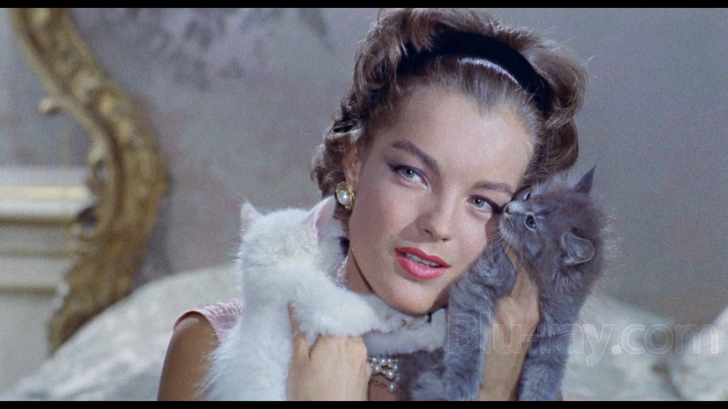
If you've picked up any of Kino-Lorber's other recent Italian releases--Yesterday, Today and Tomorrow, Marriage Italian Style, or Sunflower—you'll have a good idea of what to expect from Boccaccio '70's 1080p/AVC-encoded transfer. In short, a hands-off presentation that hasn't been fully restored—you'll see occasional specks, flecks, hairs stuck in the gate, and other bits of debris—but one that hasn't been tampered with either. There's no digital noise reduction here, no edge enhancement, no boosting or tweaking of any kind. Sharpness is hindered somewhat by the non-anamorphic lenses and grainy film stock the directors used, but overall clarity is greatly improved, revealing a finer degree detail and texture throughout. While there are some slight color fluctuations in the image from time to time, these are mild and not in the least distracting. For the most part, color is satisfyingly rich, with good contrast and black levels that are balanced and consistent. And though the film is nearly three and a half hours long, it sits comfortably on a dual-layer 50 GB disc, with no overt signs of compression. Sure, the film could certainly look better with a full, frame-by-frame restoration, but the sad fact is that not every film can get that kind of premiere treatment. All things considered, though, Boccaccio '70 looks wonderful on Blu-ray, and looks dramatically better here than it did in prior DVD releases.
Boccaccio '70 Blu-ray Movie, Audio Quality 
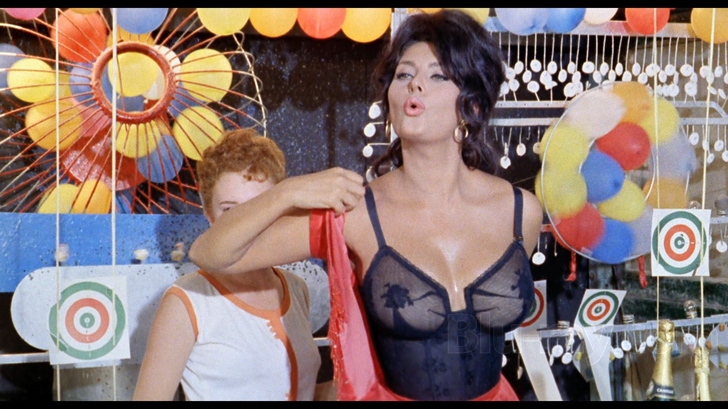
The film's Italian DTS-HD Master Audio mono track is fairly typical for an Italian movie from the early 1960s. The mix is slightly tinny and dynamically flat, but the swingy jazz/pop music sounds decent and dialogue, if not always clean, is at least balanced volume-wise and comprehensible. Some of the vocal dubbing is a bit muddy, but never to the point of distraction. Hisses, pops, and crackles are kept to a minimum and, really, that's about all there is to say here. It is what it is. The disc includes optional English subtitles—turned on by default—which appear in easy-to-read white lettering.
Boccaccio '70 Blu-ray Movie, Special Features and Extras 
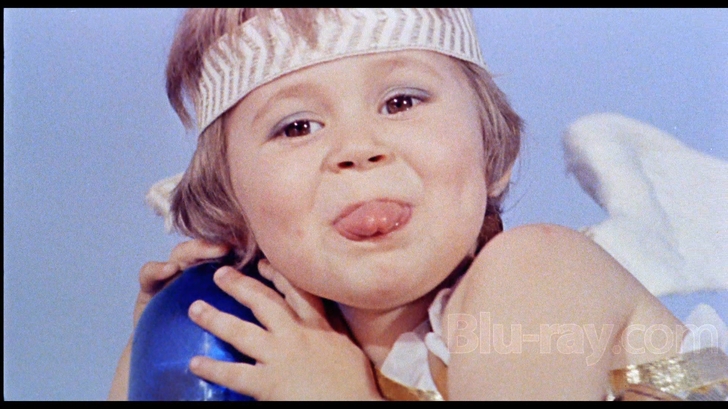
- Stills Galleries: Includes separate galleries for each of the four shorts, plus a posters gallery and one with shots from the film's American premiere.
- Trailers: Includes the original Boccaccio '70 trailer, along with trailers for Yesterday, Today and Tomorrow, Sunflower, and Marriage Italian Style. All are in high definition.
Boccaccio '70 Blu-ray Movie, Overall Score and Recommendation 
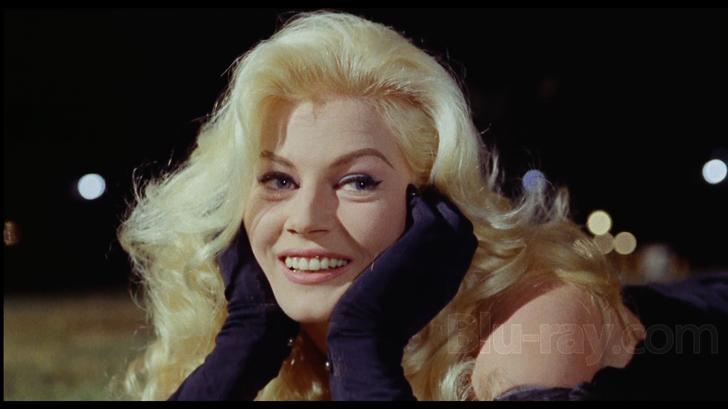
Anthology films by multiple directors are usually hit-or-miss—or else they just don't work at all—but each of the four short films in Boccaccio '70 has something to offer, and together they make up a winning, tongue-in-cheek critique of Italy's sexual mores in the 1960s. Of course, it certainly helps that the shorts feature some of the most gorgeous women ever committed to celluloid. If you're a fan of Italian cinema, this is a must-have release. Highly recommended!
Similar titles
Similar titles you might also like

Yesterday, Today and Tomorrow
Ieri, oggi, domani
1963

Marriage Italian Style
Matrimonio all'italiana
1964

The White Sheik
Lo sceicco bianco
1952

Before the Revolution
Prima della rivoluzione
1964

L' Eclisse
1962

Nights of Cabiria
Le notti di Cabiria
1957

The Hawks and the Sparrows
Uccellacci e uccellini
1966

Juliet of the Spirits
Giulietta degli spiriti
1965

The Best of Youth
2003

The Man Who Loved Women
L'homme qui aimait les femmes
1978

Sunflower
I girasoli
1970

Il Sorpasso
The Easy Life
1962

Amarcord
1973

Phantom
1922

Stolen Kisses 4K
Baisers volés
1968

2046
2004

La Ronde
1950

The Soft Skin
La peau douce
1964

Il Postino
The Postman
1994

Le Amiche
1955
